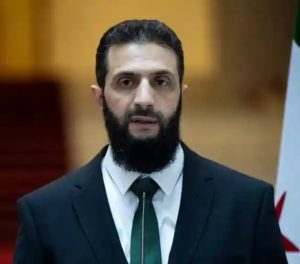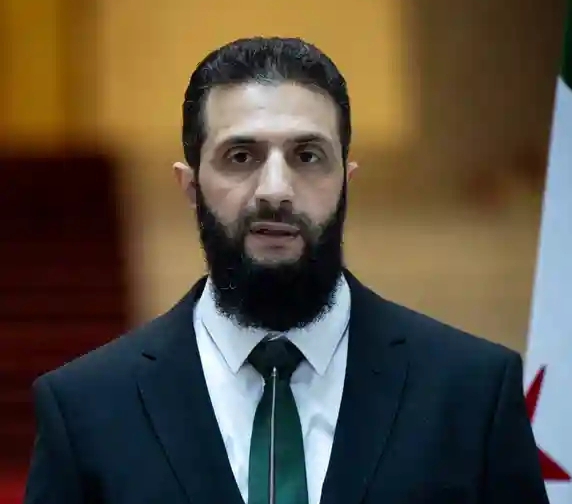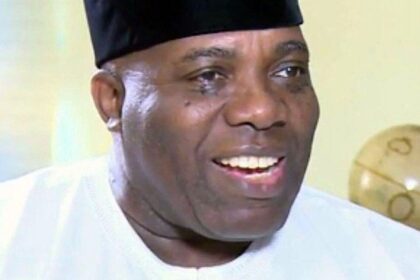
By Adeyemi Adekunle
Syria’s interim president, Ahmed al-Sharaa, has outlined a transition plan aimed at establishing political stability, holding elections, and ensuring justice following the departure of Bashar al-Assad in December 2024. In his first televised address on Thursday, al-Sharaa emphasized the need for an inclusive approach to governance, promising a national dialogue, constitutional reforms, and economic rebuilding.
Al-Sharaa announced plans to organize a national dialogue conference that would serve as a platform for discussions on Syria’s political future. He stated that the conference would be open to different viewpoints and stakeholders, aiming to develop a broad consensus on the country’s next steps. As part of this transition, he pledged to form a temporary legislative body to oversee governance until elections are held. The dissolution of Syria’s parliament on Wednesday left a gap that, according to al-Sharaa, must be addressed to ensure continuity and order in public administration.
He reiterated his commitment to drafting a new Syrian constitution. A constitutional declaration would be the next step following the national dialogue conference, providing a framework for governance reforms and legal restructuring. While acknowledging that this process could take up to four years, he argued that careful planning was necessary to establish a foundation for long-term stability.
Al-Sharaa also spoke on the need for accountability regarding past crimes committed during the country’s conflict. He vowed to pursue individuals responsible for acts of violence, whether they were in Syria or outside its borders. He stated that justice would be pursued through legal institutions and processes rather than through politically motivated actions. The goal, he said, was to build institutions that uphold the rule of law and establish clear mechanisms for legal redress.
On the economic front, he highlighted the importance of strengthening state institutions, ensuring financial transparency, and fostering economic development. He pointed to Syria’s potential in sectors such as agriculture and natural resources, stressing that investment in these areas could support the country’s recovery. Al-Sharaa emphasized that economic policies would be structured to facilitate growth and provide stability to Syrian citizens.
His speech followed a major announcement by the Military Operations Department, which stated that the 2012 constitution had been abolished, Syria’s parliament had been dissolved, and all armed factions were to be integrated into state institutions. The move was positioned as an effort to streamline governance and prevent further fragmentation. Al-Sharaa indicated that these decisions were necessary to consolidate national administration under a unified leadership and reduce the influence of non-state actors in political and security matters.
The transition comes at a time when Syria is navigating complex internal and external challenges. The departure of Assad marked a significant shift in the country’s leadership, raising questions about how power would be redistributed and what role various factions would play in shaping Syria’s future. Al-Sharaa’s emphasis on dialogue and governance reform reflects an attempt to build a framework that balances different political interests while maintaining state authority.
In his address, he also acknowledged the concerns of international observers and diplomatic partners. He stated that his administration would engage with foreign governments and organizations to secure support for Syria’s rebuilding efforts. While he did not specify particular partnerships, his remarks suggested that diplomatic engagement would play a role in the transition.
Al-Sharaa faces the challenge of maintaining stability while implementing these reforms. The process of integrating armed groups into official institutions will require coordination and oversight to prevent disruptions.
The dissolution of the parliament and the restructuring of governance will need to be managed carefully to ensure that state functions continue without interruption. His administration will also need to address public expectations regarding justice and accountability, ensuring that legal processes are conducted transparently and fairly.
His approach to economic policy will also be closely monitored. With Syria’s economy weakened by years of conflict, efforts to rebuild industries and restore financial stability will be a key measure of success. The government’s ability to implement policies that generate employment and encourage investment will be critical in determining the pace of recovery.
As Syria moves forward, the coming months will be significant in shaping the direction of the transition. Al-Sharaa’s plans for governance reform, constitutional development, and economic recovery will be tested by practical challenges and political dynamics.
The effectiveness of the national dialogue conference and the steps taken to draft a new constitution will indicate how well the transition is being managed. His commitment to justice and legal accountability will also be assessed based on the actions taken to address past human rights violations.
The process outlined by al-Sharaa represents an effort to establish a structured transition that considers governance, legal reform, and economic development.
The success of this approach will depend on how effectively it is implemented and how well it balances the interests of different political and social groups in Syria. The next phase of this transition will determine whether the country moves toward greater stability and institutional resilience.




